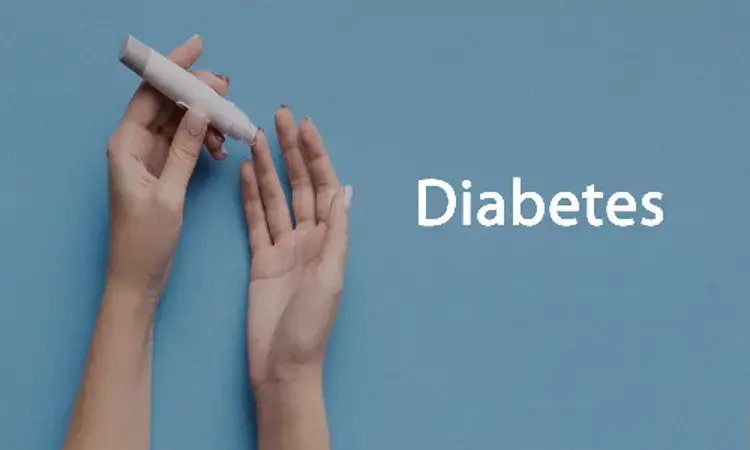- Home
- Medical news & Guidelines
- Anesthesiology
- Cardiology and CTVS
- Critical Care
- Dentistry
- Dermatology
- Diabetes and Endocrinology
- ENT
- Gastroenterology
- Medicine
- Nephrology
- Neurology
- Obstretics-Gynaecology
- Oncology
- Ophthalmology
- Orthopaedics
- Pediatrics-Neonatology
- Psychiatry
- Pulmonology
- Radiology
- Surgery
- Urology
- Laboratory Medicine
- Diet
- Nursing
- Paramedical
- Physiotherapy
- Health news
- Fact Check
- Bone Health Fact Check
- Brain Health Fact Check
- Cancer Related Fact Check
- Child Care Fact Check
- Dental and oral health fact check
- Diabetes and metabolic health fact check
- Diet and Nutrition Fact Check
- Eye and ENT Care Fact Check
- Fitness fact check
- Gut health fact check
- Heart health fact check
- Kidney health fact check
- Medical education fact check
- Men's health fact check
- Respiratory fact check
- Skin and hair care fact check
- Vaccine and Immunization fact check
- Women's health fact check
- AYUSH
- State News
- Andaman and Nicobar Islands
- Andhra Pradesh
- Arunachal Pradesh
- Assam
- Bihar
- Chandigarh
- Chattisgarh
- Dadra and Nagar Haveli
- Daman and Diu
- Delhi
- Goa
- Gujarat
- Haryana
- Himachal Pradesh
- Jammu & Kashmir
- Jharkhand
- Karnataka
- Kerala
- Ladakh
- Lakshadweep
- Madhya Pradesh
- Maharashtra
- Manipur
- Meghalaya
- Mizoram
- Nagaland
- Odisha
- Puducherry
- Punjab
- Rajasthan
- Sikkim
- Tamil Nadu
- Telangana
- Tripura
- Uttar Pradesh
- Uttrakhand
- West Bengal
- Medical Education
- Industry
Duration of incident Type 2 Diabetes linked to Aggravated cancer risk

The influence of type 2 diabetes mellitus (T2D) duration on cancer incidence remains poorly understood.
A recent study found that Incident T2 Diabetes Mellitus (T2D) was associated with higher cancer risk which peaked at approximately 8 years after a diabetes diagnosis. The study was published in the journal "Journal of the National Cancer Institute" in 2020.
Diabetes and cancer are common diseases affecting mankind which share many risk factors. It had shown a tremendous impact on the health of individuals physically, physiologically, and financially. Recent studies have found a certain association between Type 2 Diabetes incidence and cancer. Evidence also shows that certain medications used to treat Diabetes also affect the risk of cancer. But the influence of type 2 diabetes mellitus (T2DM) duration on cancer incidence remains poorly understood. Researchers from the USA and China conducted a study to find out the effect of T2DM on cancer incidence.
Researchers conducted a prospective study of cancer incidence. There were 113,429 women in the Nurses' Health Study (NHS, 1978-2014) and 45,604 men in the Health Professionals Follow-up Study (HPFS, 1988-2014). They were free of diabetes and cancer at baseline. By reviewing the medical records Cancer incidences were ascertained.
The key findings of the study were:
• In the multivariable-adjusted model incident, T2D was associated with a higher risk of cancers in the colorectum, lung, pancreas, esophagus, liver, thyroid, breast, and endometrium.
• The pooled hazard ratios (HRs) ranged from 1.21 for colorectal cancer to 3.39 for liver cancer.
• For both composite cancer outcomes and individual cancers, the elevated risks did not further increase after 8 years of T2D duration.
• The hazard ratio for total cancer was 1.28 for T2D duration of 4.1-6.0 years, 1.37 for 6.1-8.0 years, 1.21 for 8.1-10.0 years, and 1.04 after 15.0 years.
• In a cross-sectional analysis, a higher level of plasma C-peptide was found among participants with prevalent T2D of up to 8 years than those without T2D, whereas a higher level of HbA1c was found for those with prevalent T2D of up to 15 years.
Thus, the researchers concluded that Incident T2D was associated with higher cancer risk which peaked at approximately 8 years after a diabetes diagnosis. They also observed a similar duration-dependent pattern for plasma C-peptide. They further added that their findings support the role of hyperinsulinemia in cancer development.
For further reading, click the following link: https://doi.org/10.1093/jnci/djaa141
BDS, MDS
Dr.Niharika Harsha B (BDS,MDS) completed her BDS from Govt Dental College, Hyderabad and MDS from Dr.NTR University of health sciences(Now Kaloji Rao University). She has 4 years of private dental practice and worked for 2 years as Consultant Oral Radiologist at a Dental Imaging Centre in Hyderabad. She worked as Research Assistant and scientific writer in the development of Oral Anti cancer screening device with her seniors. She has a deep intriguing wish in writing highly engaging, captivating and informative medical content for a wider audience. She can be contacted at editorial@medicaldialogues.in.
Dr Kamal Kant Kohli-MBBS, DTCD- a chest specialist with more than 30 years of practice and a flair for writing clinical articles, Dr Kamal Kant Kohli joined Medical Dialogues as a Chief Editor of Medical News. Besides writing articles, as an editor, he proofreads and verifies all the medical content published on Medical Dialogues including those coming from journals, studies,medical conferences,guidelines etc. Email: drkohli@medicaldialogues.in. Contact no. 011-43720751


